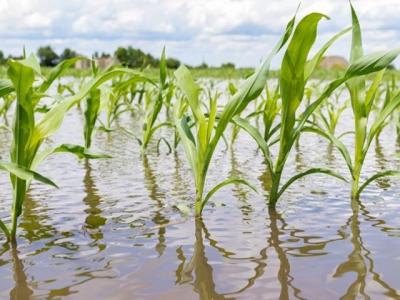Climate change is intensifying the effects of fertilizer runoff
As rainfall events become more intense and frequent, fertilizers applied to Midwestern farmland wash away, contaminating waterways near and far.
 Soil is currently facing many risks
Soil is currently facing many risks Global food insecurity could come sooner as a new soil report shows that 55% of countries surveyed lack the ability to analyze soil.
 Connecticut's largest dairy farm taps into energy markets with a plentiful supply of cow
Connecticut's largest dairy farm taps into energy markets with a plentiful supply of cow It's a common farm odor, but for Connecticut's largest dairy operator, cow manure is the smell of money.
 Carbon farming opportunities beckon farmers
Carbon farming opportunities beckon farmers Farmers must feel like major league rookies as they evaluate the barrage of carbon markets pitched their way.
 Agricultural by-products going to waste
Agricultural by-products going to waste The annual volume of agricultural by-products generated in Vietnam is around 157 million tons, most of which simply goes to waste.
 Protecting marine environment decides sustainability for aquaculture
Protecting marine environment decides sustainability for aquaculture Localities need to develop concentrated areas for aquaculture, converting from traditional farming methods to industrial fish culture applying high technology.
 Waste collection in aquaculture is urgent to conserve aquatic resources
Waste collection in aquaculture is urgent to conserve aquatic resources The collection of waste in aquaculture is very necessary and urgent in order to gradually improve the environment in the farming area and conserve the aquatic
 Cargill outlines ambitious carbon reduction goals for aquaculture
Cargill outlines ambitious carbon reduction goals for aquaculture A new initiative that aims to help aquaculture operators reduce their carbon footprints has been launched by Cargill today.
 Paving the way to tackle proliferative kidney disease in aquaculture
Paving the way to tackle proliferative kidney disease in aquaculture New research from the University of Aberdeen could allow the development of drugs and vaccines to treat a disease that is rapidly emerging in aquaculture
 Can probiotics solve aquaculture’s water pollution issues?
Can probiotics solve aquaculture’s water pollution issues? Multiple studies have shown that bacillus probiotics can help aquaculture producers improve fish health and performance – but can probiotics help address water
 Warning of organic pollutants from aquaculture
Warning of organic pollutants from aquaculture The stocking areas of farm-raised shrimps have reached 708,436 ha, equal to 102% of the same period last year. The white leg shrimp farming area
 Microplastics linked to gill health issues
Microplastics linked to gill health issues Fish that are subjected to chronic exposure to microplastic fibres suffer from issues including aneurysms and gill damage, according to a new study.
 Pond-cultivated algae: Slimy superhero for aquafeeds?
Pond-cultivated algae: Slimy superhero for aquafeeds? A key to solving the omega-3 bottleneck for aquaculture feeds could lie at the bottom of a pond, in the desert.
 To protect sensitive habitat, oyster farms turn to high-tech tools
To protect sensitive habitat, oyster farms turn to high-tech tools A three-year study using drone cameras is now underway to track interactions between oyster farming and eelgrass beds.
 Canada invests in ‘clean-tech’ aquaculture
Canada invests in ‘clean-tech’ aquaculture A handful of aquaculture companies in British Columbia are upgrading their equipment to make their businesses cleaner, more sustainable
 Is the aquaculture of invasive and non-native species worth the risk?
Is the aquaculture of invasive and non-native species worth the risk? Following a recent report from the FAO on the threats posed by the production of invasive (potentially non-native) species in aquaculture
 Marine pests
Marine pests A marine pest is a non-native marine plant or animal that harm Australia’s marine environment, social amenity or industries that use the marine environment
 Can salmon farming cope with climate change?
Can salmon farming cope with climate change? Researchers have evaluated how climate change could affect Norwegian salmon farming over the next 50 years.
 Toxicity of chemical substances in aquaculture
Toxicity of chemical substances in aquaculture The dictionary definition of toxicity is “the quality, relative degree, or specific degree of a substance being toxic” and toxic is further defined
 Microbial activity assessment based on hydrogen peroxide decomposition rates
Microbial activity assessment based on hydrogen peroxide decomposition rates Microbial water quality assessment has the potential to provide insights into the temporal and spatial dynamics of bacterial communities within aquaculture
